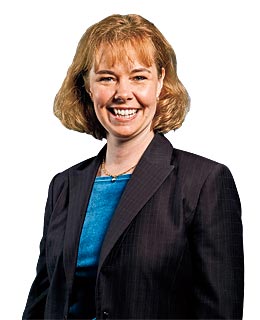
Christine Lampe-Onnerud, Founder and CEO of Boston Power.
In early 2005, after quitting her job in a technology consulting firm, Christina Lampe-Onnerud founded Boston-Power. She then headed to China, ponying up her own money to test-run designs of a more muscular lithium-ion battery that could sustain 1,000 charge-and-discharge cycles (vs. the standard few hundred) with no loss of cell capacity over time. A couple of months later, she had a viable product — "the next-generation lithium-ion battery," says CEO Lampe-Onnerud — and shortly after HP as a partner. A second Boston-Power lithium-ion battery, primarily used in electric vehicles, is also making headway. "The portable-electronics industry has recognized this technology as a disruptive innovation," she says. There's a good reason companies are eager to get into the high-efficiency lithium-ion-cell business, says Rob Enderle, a technology analyst at the Enderle Group. "Within three to five years, when the price comes down, I expect this new lithium-ion-battery technology will be the industry standard."
—Coeli Carr